GCSE Course Guide
2025-2027

‘Excellent in all areas’ ISI December 2022


2025-2027

‘Excellent in all areas’ ISI December 2022

Welcome to the GCSE Course Guide for 20252027 As you look towards moving into Year 10 next September, you will be embarking on an exciting time in your education It will be the first opportunity for you to start focusing on the subjects in which you are most interested With this choice can come a degree of confusion and uncertainty, but please rest assured that the staff at Halliford School are very experienced in guiding our students through this process and helping you make the right choices
The decisions you will make as you choose your GCSE courses are very important ones and may well have an impact on future studies . Therefore, it is important that you make the choices wisely and listen to the advice on offer from your teachers and parents As the examinations system in the UK has changed a great deal, experience shows us that universities are paying close attention to the grades that you achieve at GCSE, and so it is even more important than ever to make the right choices
There is no doubt that GCSEs are rigorous qualifications, and there is a real focus on terminal examinations at the end of the two years to assess your performance . This is why we have been preparing you for this process in your Year 9 Study Skills course
This guide contains a great deal of information about how to make your choices, which choices are available and lots of information on the content of each course Please take time to read it carefully and discuss any queries you have with your tutor and subject teachers
On Thursday 13th February we will host our Year 9 GCSE Options Evening when all the Heads
of Department will be available to discuss each of their subjects with you and your parents Following this evening, you will then be asked to make your initial choices
As you know, we offer many opportunities at Halliford outside the classroom, and it will be important for you to continue to take part in and perhaps even lead some of the co-curricular activities the School offers Taking part in these teams and clubs helps to develop you as a character and provides you with vital skills that are highly prized by universities and future employers At Halliford School, we want you to be a truly rounded person and remember to work hard but also play hard
Please know that your tutor, teachers, and I are here to help and guide you throughout this process I wish you every success in your GCSE courses and look forward to seeing you grow in confidence and make excellent progress in the coming terms
Good luck .
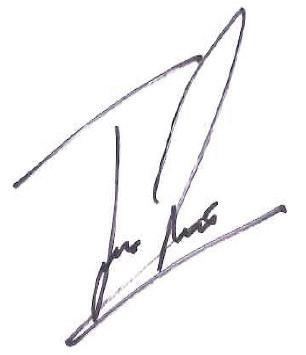
James Davies Headmaster

We hope that as a result of a broad curriculum and wide-ranging co-curricular programme, our students will discover subjects about which they are passionate The end of Year 9 represents a shift from breadth to depth as, at GCSE, subjects are studied in more detail Subjects also have more time associated with them This combination of depth and time allows for the development of detailed expertise and mastery of the skills involved
The options evening represents an important point in your son’s development, as they finish a common curriculum and begin to choose which subjects they would like to study more independently
Halliford is a small school One of the benefits of this is that we can build our timetable around the choices of the boys As such, boys can, in theory, choose any combination of the optional subjects we offer
Regardless of which subjects are selected by your son, we hope to inspire, challenge and support them by having high expectations and holding them to this standard
A combination of good guidance, independent choice and excellent provision should allow your son to achieve the best possible outcomes at the end of their GCSE journey
I wish you the very best in the options process If you have any questions about the subjects, please contact the relevant teachers or Heads of Departments directly If your question is about the process itself, please do not hesitate to contact me .
Best wishes,

Richard Fulford Deputy Head Academic
All students at Halliford School will study the following GCSE courses:
• English Language
• English Literature
• Mathematics
• Biology, Chemistry, Physics
• A Modern Foreign Language – with a choice of French / German / Spanish
• Games – there continues to be a weekly compulsory games afternoon once a week for all students .
• PSHE
• Art and Design
• Business Studies
• Classical Civilisation
• Computer Science
• Design and Technology
• Drama
• French – if you wish to study two languages, then you should select French as one of your options and the other modern foreign language as your compulsory language
• Geography
• History
• Latin
• Music
• Physical Education
• Religious Studies
How does the choices process work?
We offer an initial free choice of all subjects so that we can strive where possible to offer the best series of subject combinations to our students Clearly though, the demands of timetabling will mean that particular combinations of subjects will not be possible in a few cases . We will construct our timetable based on student choices and aim to meet as many combinations as possible .
You will initially be asked to choose three subjects from the list of courses along with a reserve subject, should your initial choices not be possible . Once we have received your choices, for the purpose of timetabling, the option subjects will be arranged into three blocks which are given an equal time allocation of four periods per week
Once the students have chosen their GCSE options, the timetable and ‘option blocks’ are constructed . Following this, if you wish to alter your choices (in discussion with and approval from the Deputy Head Academic), not all selections will be possible as two of the newly desired choices may be taught at the same time
In some subjects, not taking a subject at GCSE will not preclude a suitable student from taking up this subject again at A Level, subject to the permission of the Head of Department The School also reserves the right to veto any classes where there are insufficient numbers to warrant a particular choice Initial subject choices must be returned to the Deputy Head Academic, no later than Monday 24th February 2025
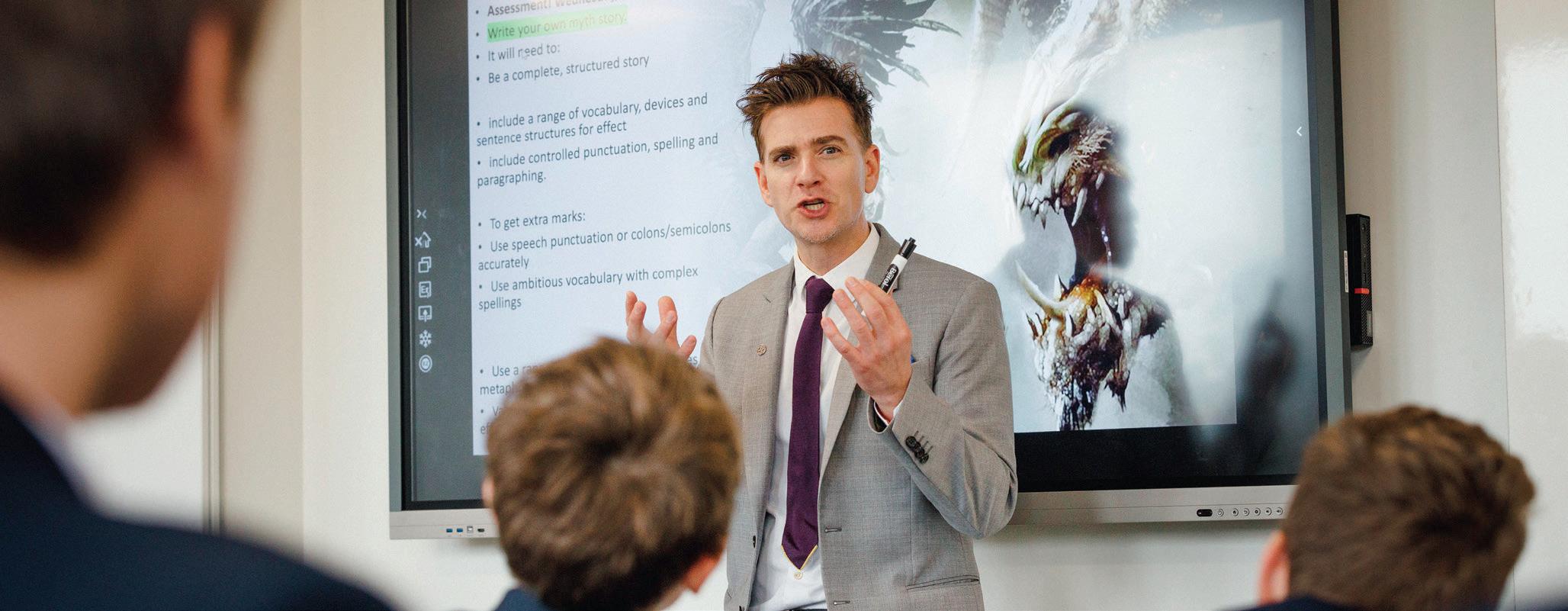
Your choice of GCSE subjects should be determined by four important factors:
• Your ability and/or aptitude for all your chosen subjects
• Your interest and enthusiasm for all your chosen subjects
• The relation of your chosen subjects to each other
• Your plans for higher education and a career
Some of you already have a clear idea of your chosen career and therefore of the subjects you might want to choose for GCSE
For most of you, the subjects you are good at will also be the ones you like, and they will, therefore, probably combine well with each other However, many of you have not yet decided on a career path, and for you, the choice can be bewildering You can find details of the content and assessment procedures of these courses in this booklet
You should consult as widely as possible before making any
decision . Heads of Department will offer you advice on your ability in the subject and will give you further details on the course content and nature of assessment Your tutor will give you an overall picture of your academic programme and should be the first point of contact for you and your parents .
For the vast majority of students, the best advice is to be guided by subjects that you find most interesting and which will present you with the greatest chance of success at the end of Year 11 This will provide you with the best chance to make the next successful transition into the Sixth Form . You should choose your option subjects carefully, as changing your option choices in Year 10 will result in you having to catch up with written work and previous assignments, independently Changes after the end of September are not possible due to the amount of work missed, and choices are subject to the approval of your teachers and only possible where there are spaces in a class .
In Years 10 and 11, students continue their involvement in sport in a range of different competitive and recreational activities Games options in Year 10 include rugby, football, and cricket In Year 10, teams are entered for the Middlesex Cup, the NatWest Schools Cup, a variety of Rugby 7s competitions and the Surrey County Cup for Cricket .
In Year 11, students join the Sixth Form to compete in the Super 7 series in rugby, football, and cricket at senior level Other activities on offer include health-related fitness, basketball, netball, badminton, squash, golf, swimming, and volleyball
In Years 10 and 11, students follow a PSHE programme which is comprised of study skills, citizenship, careers, religious studies, and health education The course is designed to make students more aware of their environment and the people around them .
Careers education and advice is delivered by visiting speakers, work experience, resources in the Learning Resource Centre and visits to careers conventions There are close links with
the Careers Service in Staines, and the Careers Consultant is a regular visitor
In Year 11, students have the opportunity to take part in careers advice from our independent careers guidance counsellor .
Some students will qualify for extra time or the assistance of a reader or scribe in their examinations or other special access arrangements The school’s SEND Policy runs in tandem with the requirements of the Joint Council of Qualifications (JCQ) to ensure that these students are not substantially disadvantaged .
Learning Support is offered in a variety of ways Staff at Halliford School are trained in the delivery of Quality First Teaching, which ensures that lessons are suitably differentiated to meet the students’ learning needs Where a student needs individual or small group additional support, this can be arranged . In a small number of cases, students may be allowed to study one fewer GCSE subject at the discretion of the Deputy Head Academic For those students who require additional support, there may be an additional charge
If you think additional help to support your son’s learning is necessary and you are not receiving this, please contact the Head of Learning Support (SENDCo) or the Deputy Head Academic
Overview
Students will read a range of texts that are engaging and diverse. The texts include poetry and prose, as well as non-fiction texts. Students will read and respond to material from a variety of different resources. They will be able to make comparisons between texts and analyse the ways in which writers achieve their effects. Students will also be able to construct and convey meaning in written language, matching style to audience and purpose.
Students at Halliford School take the International GCSE (IGCSE) in English Language.
The aims and objectives of this qualification are to enable students to:
• Read a wide range of texts fluently and with good understanding
• Read critically and use knowledge gained from wide reading to inform and improve their own writing
• Write effectively and coherently using Standard English appropriately
• Use grammar correctly, punctuate and spell correctly
• Acquire and apply a wide vocabulary alongside knowledge and understanding of grammatical terminology, and linguistic conventions for reading, writing and spoken language
• Listen to and understand spoken language and use spoken Standard English effectively
Assessment
In English Language GCSE, students are taught in sets There are three higher mixed ability sets and one support set
Mixed Ability Sets: Paper 1 and Paper 2 (No Non-Examined Assessment)
Support Set: Paper 1 and Non Examined Assessments in Poetry and Imaginative Writing

Examination:
Paper 1: Non-fiction and Transactional Writing Exam - 2 hours and 15 minutes 60% of final mark
Paper 2: Poetry, Prose and Imaginative Writing Exam - 1 hour and 30 minutes . 40% of the final mark .
English Language GCSE is designed to help students develop reading, writing and analytical skills, all of which are highly transferable to various situations A good understanding of the use of the English Language is key to the future success of Hallifordians, who will need a GCSE in English Language to be able to study at any British university .
Almost all career paths will require students to be able to read and assimilate information, to write reports and make presentations and to understand and respond to information presented in a range of different styles and registers . These are the skills they learn through the study of English Language at GCSE level A good GCSE in English Language will also prepare students well for the study of English Language and many other subjects at A Level
“I really enjoy my English classes at Halliford, as Mr Hoare is an excellent teacher who has made learning engaging and fun. Imaginative writing has been a highlight for me this year since it is such an interesting and emotional undertaking. Additionally, analysing poetry has helped me develop many valuable skills that I have been able to apply in other areas of school, such as Science. Overall, my experience in English has been incredibly rewarding and enriching.”
Exam Board: Edexcel (4ET1B)
English Literature will broaden and develop learners’ skills and encourage them to read and respond to a wide range of literary texts. They will appreciate the writer’s craft and find enjoyment in reading literature. Students at Halliford School take the International GCSE (IGCSE) in English Literature.
Students will read a range of texts that are engaging and diverse . They will engage and develop their ability to read, understand and respond to a wide range of literary texts from around the world Students will develop an appreciation of the ways in which writers achieve their literary effects and develop the skills needed for literary study
Students will explore, through literature, the cultures of their own and other societies and find enjoyment in reading literature and understanding its influence on individuals and societies
Assessment
The setting is the same as for English Language, however, all sets complete the following process of assessment
Examination:
Paper 1: Poetry and Modern Prose (60% of Literature Grade)
• Section A – Unseen Poetry: one 20-mark essay question exploring the meaning and effects created in an unseen poem . The poem will be reproduced in the question paper
• Section B – Anthology Poetry: one 30-mark essay question from a choice of two, comparing two poems from Part 3 of the Pearson Edexcel International GCSE English Anthology
• Section C – Of Mice and Men: one 40-mark essay question from a choice of two on each of the set texts

Non-Examined Assessment:
Modern Drama - An Inspector Calls by J .B . Priestly (20% of Literature grade)
Literary Heritage Texts - Macbeth by William Shakespeare (20% of Literature grade)
English Literature broadens students’ potential prospects and enables them to develop valuable analytical and oral skills that are desirable to employers and universities, in addition to affording them the pleasure of studying well known literary texts in depth It also provides a good foundation for the study of English Literature and other essay-based subjects (such as History or Religious Studies) at A Level
Former students from Halliford School have gone on to read English Literature at Exeter University and Sussex University .

“I have greatly enjoyed studying English at GCSE level. The course provides a wide range of interesting topics, from Modern Literature to Shakespeare and beyond. The course is delivered by a great team of teachers who do an excellent job of making content entertaining, inspiring and exciting to learn, and the inclusion of coursework in the Literature section of the course allows for GCSE work to be developed over time with feedback, ensuring greater understanding and improved critical thinking skills. The engaging nature of English GCSE has inspired me to consider taking it at A Level, and I would thoroughly recommend the course.”
Mathematics uses its own language, made up of numbers, symbols and formulas, to explore the rules we need to measure or identify essential problems like distance, speed, time, space, change, force, and quantities. Studying Mathematics helps us find patterns and structure in our lives. Mathematics helps us put a price on things, create graphics, build websites, build skyscrapers, and generally understand how things work or predict how they might change over time and under different conditions.
Students at Halliford School take the Edexcel International GCSE (IGCSE) in Mathematics.
The aims and objectives of this qualification are to enable students to learn:
• Number
• Algebra
• Graphs
• Shape and Space
• Data Handling
• Differentiation – tangents, turning points
• Set theory
Topics on the course include:
• Arithmetic Series
• Completing the square
• Trigonometric graphs
• Transformations of graphs

Two equally weighted papers, each worth 50% of the final mark . There is no coursework
Foundation Tier: 2 X 2-hour Calculator papers
Grades possible: 5 – 1
Higher Tier: 2 X 2-hour Calculator papers
Grades possible: 9 – 3
GCSE Mathematics is a basic entrance requirement for many degree courses and, of course, provides the foundation for the study of Mathematics at A Level
Students with a GCSE and/or A Level in Mathematics can go into a variety of different careers such as: Accounting, Medicine, Engineering, Forensic Pathology, Finance, Business, Consultancy, Teaching, I .T ., Games Development, Scientific Research, Programming, the Civil Service, Design, Construction and Astrophysics to name just a few
“The GCSE Mathematics course is both interesting and engaging. Many fascinating topics, such as circle theorems and differentiation, allow you to apply your problem-solving techniques to solve questions. Towards the end of the paper, the questions with the highest marks are tricky but satisfying to answer, and they provide a distinct feeling of achievement when you finally understand them.”
Overview
Exam Board: AQA (Course code : 8365)
This qualification fills the gap for high achieving students by assessing their higher order mathematical skills, particularly in algebraic reasoning, in greater depth, thus preparing them fully to maximise their potential in further studies at A Level. It offers the opportunity for stretch and challenge that builds on the Key Stage 4 curriculum and is intended as an additional qualification to the IGCSE Mathematics, rather than as a replacement. The content assumes prior knowledge of the Key Stage 4 Programme of Study and covers the areas of algebra and geometry, which are crucial to further study in the subject, in greater depth and breadth. This qualification places an emphasis on higher order technical proficiency, rigorous argument and problem solving skills. It also gives an introduction to calculus and matrices and develops further skills in trigonometry, functions and graphs. You can find out about this qualification at aqa.org.uk/maths
• Number
• Algebra
• Coordinate Geometry (2 dimensions only)
• Calculus
• Matrix Transformations
• Geometry
Assessment
Paper 1 : Non-Calculator
1 hr 45 mins, 80 marks
Paper 2 : Calculator
1 hr 45 mins, 80 marks
Questions: A mix of question styles, from short, single-mark questions to multi-step problems The mathematical demand increases as the student progresses through the paper

The AQA Level 2 Certificate in Further Mathematics is an untiered Level 2 linear qualification for learners who:
• either already have, or are expected to achieve, grades 7, 8 or 9 in GCSE Mathematics
• are likely to progress to A Level study in Mathematics and possibly Further Mathematics
Although not an essential pre-requisite for A Level study, this course gives students a taste of what A Level study will entail should they choose to take this subject in the Sixth Form This course has proved hugely helpful for students who were wavering with their A Level subject choices
Josh“Further Mathematics allows you to explore the subject in a greater depth. Students can expand their mathematical knowledge and abilities in a wide array of engaging topics that would not have been encountered in the regular Mathematics course, such as matrices and The Factor Theorem. The course is intellectually stimulating and ideal for intellectually curious students who desire a challenge beyond the regular GCSE course. It is a rewarding course, especially for those interested in taking maths at A Level, as there is a large overlap between the courses, and it provides an ideal foundation for success in A Level Mathematics.”
The study of Biology connects us to the world we are living in and reminds us of our interactions with all other life forms. It develops awareness of the significance of unique fauna and flora and distinctive ecosystems. It provides opportunities to learn about the processes of all living things. What students learn is directly relevant to our species and the environment.
The main topics covered within the GCSE Biology course are:
• Cell biology
• Organisation
• Infection and response
• Bioenergetics
• Homeostasis and response
• Inheritance, variation, and evolution
• Ecology
Practical work is a key feature of the GCSE Biology course You will undertake a minimum of 8 required practical activities to further your understanding and enjoyment wherever possible


There are 2 examinations at the end of the course, after which students are awarded a grade 9 – 1 .
Paper 1: 1 hour 45 minutes, 100 marks 50% of the GCSE Topics 1 – 4
Paper 2: 1 hour 45 minutes, 100 marks 50% of the GCSE Topics 5 – 7
Both papers have a range of structured closed short answers and longer open response questions The required practical tasks are examined in the written papers
Through the study of Biology, you will gain problem solving, analytical and evaluation skills . These skills are transferable to a range of A Levels, apprenticeships, and professions Universities and future employers look at your GCSE Biology result even if you are not looking to study the subject beyond Key Stage 4
Biology is a key subject for lots of STEM careers including nursing, dentistry, forensic science, psychology, physiotherapy, botany, environmental science, zoology, geology, oceanography, pharmaceuticals, energy, teaching, science writing, genetics, and research
“Biology was my favourite subject at GCSE as it covered interesting topics such as genetics and ecology. I particularly loved the dissections, especially the liver and heart. It was fascinating to see the complex structures up close and understand how they function. The hands-on experience made the subject easier to understand and very engaging.”
Exam Board: AQA (8462)
Through studying GCSE Chemistry you will gain an appreciation of many real life applications of Science, including every day, industrial and environmental aspects. You will build upon the fundamentals of Chemistry (atoms, bonding and moles) studied in Year 9 to learn about how and why reactions take place. You will also learn about a wide range of chemicals and materials used in the home, in agriculture and in industry.
The main topics covered within the GCSE Chemistry course are:
• Atomic structure and the periodic table
• Bonding, structure and the properties of matter
• Quantitative chemistry
• Chemical changes
• Energy changes
• The rate and extent of chemical change
• Organic chemistry
• Chemical analysis
• Chemistry of the atmosphere
• Using resources
Practical work is a key feature of the GCSE Chemistry course You will undertake a minimum of eight required practical tasks, but we aim to use practical activities to further your understanding and enjoyment wherever possible .
There are two examinations at the end of the course after which you will be awarded a grade 9 – 1
Paper 1: 1 hour 45 minutes, 100 marks 50% of the GCSE; Topics 1 – 5

Paper 2: 1 hour 45 minutes, 100 marks 50% of the GCSE; Topics 6 – 10
A range of question types will be used in both papers, including multiple choice, short answer and those that require extended responses The required practical tasks are examined in the written papers
Through the study of Chemistry, you will gain problem solving, analytical and evaluative skills These skills are transferable to a range of A Levels, apprenticeships, and professions . Universities and future employers look at your Chemistry GCSE result, even if you are not looking to study the subject beyond Key Stage 4
Chemistry is an essential requirement at A Level for many degree courses such as Medicine, Veterinary Science and Chemical Engineering Some Geography, Psychology and Earth Science degrees may require a mix of Science subjects, and Chemistry can be one of them
The study of Chemistry opens many doors career-wise and can also lead to careers in Sports Science and the financial sector .
“The AQA GCSE Chemistry course covers a plethora of intriguing topics that are both interesting and useful. The course is very intricate and has a good balance between practical and theoretical chemistry. It provides a very good foundation for the A Level course, and the constant support from my teacher and the stimulating nature of the subject inspired me to study Chemistry for A Level.”
Have you ever wondered why the sky is blue? Or how the sun generates heat and light? Or even what special relativity has to do with electromagnetism? Physics is crucial to understanding the world around us, the world inside us and the world beyond us. It encompasses the study of the universe from the largest galaxies to the smallest subatomic particles.
The main topics covered within the GCSE Physics course are:
1 . Energy
2 Electricity
3 Particle model of matter
4 Atomic structure
5 Forces
6 . Waves
7 Magnetism and electromagnetism
8 Space physics
Practical work is a key feature of the GCSE Physics course You will undertake a minimum of 8 required practical tasks, but we aim to use practical activities to further your understanding and enjoyment wherever possible .
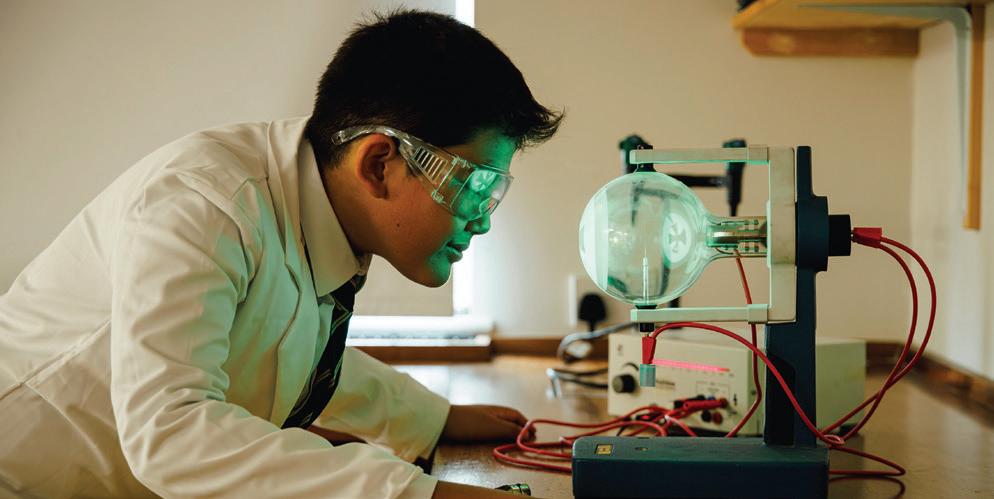

There are two examinations at the end of the course after which you will be awarded a grade 9 – 1
Paper 1: 1 hour 45 minutes, 100 marks 50% of the GCSE; Topics 1 – 4
Paper 2: 1 hour 45 minutes, 100 marks . 50% of the GCSE; Topics 5 - 8
Both papers have a range of multiple choice, structure, closed short answer and open response questions The required practical tasks are examined in the written papers
The Study of Physics will allow you to develop great problem solving, communication, organisation, interpersonal, numeracy and research skills . These skills are transferable to a range of A Levels, apprenticeships, and professions
Physics is an essential requirement at A Level for many courses such as engineering, astronomy and computer science . It can be useful in careers such as finance, architecture, forensic science or even games designing
The study of Physics really opens your opportunities and is seen as one of the most challenging and rewarding subjects to study
“GCSE Physics was a fascinating subject, where I learnt about many interesting topics such as energy resources and radioactivity. We had the opportunity to do amazing practical work, allowing us to take what we learnt from our textbooks into an experiment and see Physics in action. The Science Department was really supportive in helping us ensure we were prepared for our GCSE, and their encouragement made me want to take Physics at A Level.”
Overview
Exam Board: AQA (8464)
We are true to our Prospectus and are academically ambitious for your son. As such, all Year 9 students begin their GCSE study on the GCSE separate science courses. At the start of Year 10, we will make the decision with you and your son as to whether they should continue with the separate sciences or move over to the Combined Science Course.
In addition, practical work is a key feature of the GCSE Trilogy course You will undertake a minimum of 21 required practical tasks, but we aim to use practical activities to further your understanding and enjoyment wherever possible
There are six examinations at the end of the course, two in each of the Sciences, after which you will be awarded two grades between grades 9 – 1 Each Science will be examined using the following structure for their two papers
Paper 1: 1 hour 15 minutes, 70 marks .
Paper 2: 1 hour 15 minutes, 70 marks
A range of question types will be used, including multiple choice, short answer and those that require extended responses The required practical tasks are examined in the written paper
The Trilogy Award is an alternative route to studying separate Sciences and students will come out with 2 GCSEs in Science Students who follow this route are still able to go on to study Science at A Level

“The GCSE Combined Science course was a great opportunity, allowing me to proudly achieve two high GCSE grades. The teachers in the Science Department were incredibly supportive throughout the course, and looking back, I remember those lessons being absolutely awesome. The lessons were fun, educational, and genuinely interesting, and I am very grateful for all the teaching and support I received from the whole department.”
Because of the ever-increasing need for workers with competence in at least one European language, Halliford School, as with all other independent secondary schools, insists on its students continuing to GCSE in at least one foreign language.
If your son at present is studying just one language in Year 9, then he must choose that one language which he will study through to GCSE . If your son is studying two languages in Year 9, he can choose to continue with both languages to GCSE, or just continue with one of them If your son has a gift or a love for both languages he really should continue with both languages
The authentic situations and stimuli of the course will enable students to see language in context and learn about the culture of the target language country It is an engaging and inspirational course of study that will enable students to use the target language effectively, independently and creatively, so that they have a solid basis from which to progress to A Level or employment Questions across all four language skills are set in common contexts, addressing a range of relevant contemporary and cultural themes They are organised into six broad thematic contexts:
• My personal world
• Lifestyle and wellbeing
• My neighbourhood
Assessment
• Media and technology
• Studying and my future
• Travel and tourism
Paper 1: Speaking (internally conducted, externally assessed–25% of the total qualification

Paper 2: Listening and Dictation in the target language (25% of the total qualification)
Paper 3: Reading and understanding in the target language (25% of the total qualification)
Paper 4: Writing in the target language (25% of the total qualification)
Students must complete their speaking assessment in April/ May and all other assessments in May/ June in any single year Each paper is available at Foundation tier or Higher tier Students must be entered for a single tier across all papers
Whatever you are planning to do later in life, you are bound at some stage to need a foreign language, whether it is for business or holiday use A foreign language gives us access to another culture, and our lives take on a new dimension The more languages you know, the easier others become, and it is one of the few subjects which are easier to learn when you are young!
The skills that students acquire through the study of modern foreign languages (such as self-discipline, the ability to memorise information, the ability to apply rules logically and methodically) are highly prized by universities and employers and lead to a wide range of career opportunities from the Civil Service to engineering, medicine or financial services .
“One of the best things learning languages at school prepares you for is the ability to connect and communicate with people from different countries. It opens up a world of opportunities for travel and work later in life, allowing me to immerse myself in new environments. I studied French and German for GCSE and am now doing French for A Level, which gives my studies an international dimension.”
Exam Board: Edexcel (1FA0)
On average 97% of Halliford boys who take Art GCSE gain a grade 7 or above.
Art is suitable for all with an interest in learning about and practising Art and Design and essential for those intending to pursue an interest in one of the many and varied careers in the creative industries.
You will have the opportunity to learn various techniques and develop a working knowledge of materials, practices, and technology in your chosen discipline You will be encouraged to develop the skills to interpret and convey ideas and feelings and develop your imagination and creative powers and your experimental, analytical, and documenting skills You will also develop a specialist vocabulary and an understanding of the place of Fine Art in history and contemporary society
Component 1: Personal Investigation, worth 60% This will comprise of several projects together with workshops and homework The aim is to produce a portfolio of coursework documenting your ideas, exploration, technical ability, as well as final outcomes
Component 2: Externally Set Assignment, worth 40% . This will comprise of one project starting at the beginning of February There will be a 10-hour controlled assessment at the end of the course in April and will be held over two days in the Art Studios
GCSE Art and Design is a prerequisite for further study at A Level and other further and higher education Students from our courses have gone on to study product design, fashion, textiles, glass, ceramics, fine art, graphic design, interior architecture, game design and advertising . There have been many that have pursued architecture and have been successful in gaining

places at highly selective universities including Cambridge, UCL and Oxford Brookes In addition to those that have gone into further art and design study many others have been successful in gaining a place on courses such as engineering, business, and management .
The activities that enrich art are photography, drawing workshops, art exhibitions and keeping abreast with fine art through magazines such as Ceramics Review, Crafts, Art Quarterly, and weekend newspaper supplements .

“GCSE Art gave me the chance to explore and improve my creative skills using lots of different materials, both new and familiar. The teachers in the Art Department were really supportive, helping me put together a portfolio of varied physical and digital pieces. I really enjoyed the whole process, and the skills I have learned will definitely help me in the future.”
Business Studies GCSE is suitable for all students who enjoy:
• Communicating and explaining your ideas
• Thinking creatively and making decisions
• Working with numbers to solve business problems
Exam Board: Edexcel (1BS0)
• Learning about the world of business through real and relevant local and international brands
You will study two main themes:
1. Investigating a Small Business: This looks at key business concepts, issues and skills involved in starting and running a business . It focuses on the role of the entrepreneur and the importance of finance within a business
2. Building a Business: This looks at how a business develops beyond start up It looks at the decisions used to grow a business with an emphasis on marketing, operations, finance, and human resources .
Theme 1 – 90-minute final exam (50% of final qualification)
Theme 2 – 90-minute final exam (50% of final qualification)
Each paper is divided into three sections: Section A – 35 marks, Section B – 30 marks and section C – 20 marks
Each paper will consist of calculations, multiple choice, short answer, and extended writing questions . Section B and C will be based on business contexts

Students who take GCSE Business Studies frequently go on to take Business Studies or Economics at A Level Nearly all students will end up either working in a firm or running their own – so some knowledge of how a business works can be invaluable in the future
Finally Business Studies has many transferable skills It will improve your decision making skills and your proficiency with numbers and planning In addition it enables you to develop your powers of analysis and evaluation as well as your ability to deal with intellectual ambiguity
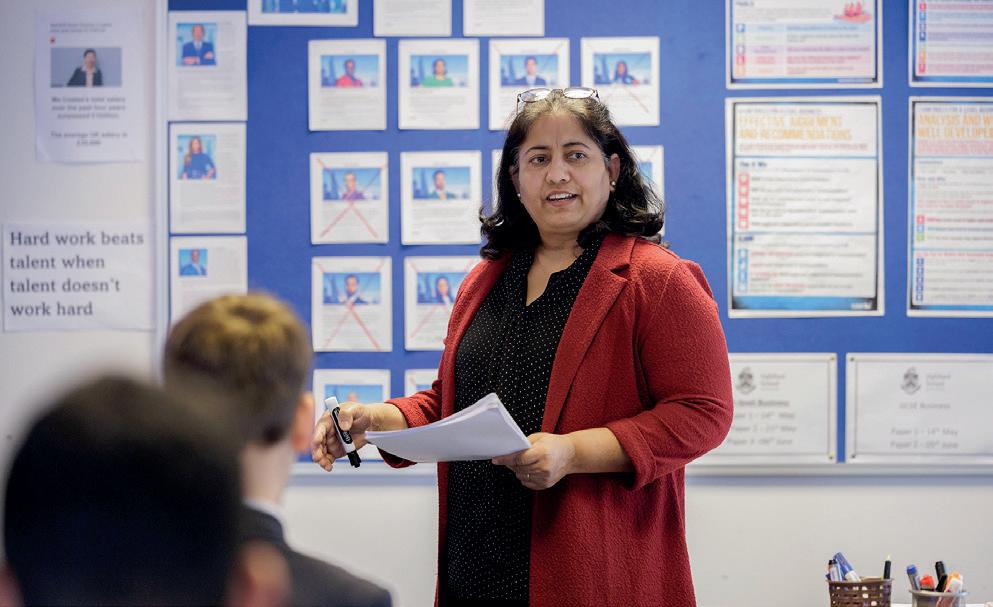
“Through studying Business Studies at GCSE I have learnt about different aspects of business, such as entrepreneurship and business growth, topics which I have found most interesting. The Business Studies course has provided me with a useful insight into the real world which sets it apart from other subjects, and so I feel more prepared for the challenges and opportunities that lie ahead after school.”
Exam Board: OCR (J199A)
Have you ever wondered about the ancient times before the advent of Christianity? If you have a curious mind and enjoy literature, history, and archaeology then Classical Civilisation is for you!
You will have a chance to do an in-depth study of Homer’s The Odyssey and the world in which this poem would have been written
In addition, the course has an exciting new element called Myth and Religion which examines the ancient stories of the Gods and the importance of worship and sacrifice in ancient Greece and Rome .
If you study Classical Civilisation you will gain a broad knowledge and understanding of a range of literary and cultural materials from the classical world and the ability to use these to acquire knowledge and understanding of aspects of the classical world
Furthermore, you will use your knowledge, in conjunction with your analytical and evaluative skills, to gain insight into the classical world from the literary and material culture studied You will also develop an awareness of how classical sources reflect issues relevant both in the classical work and today, such as questions of gender, belief, sexuality, and citizenship
Assessment
Two external examinations taken at the end of the two-year course:
1. The Homeric Word: 1 hour 30 minutes, 90 marks = 50%
2. Myth and Religion: 1 hour 30 minutes, 90 marks = 50%

Classical Civilisation has been designed to provide learners with a broad, coherent, and rewarding study of the culture of the classical world It offers learners the opportunity to study elements of the literature and visual/ material culture of the classical world and acquire an understanding of their social, historical, and cultural contexts
You can go on to study Classics in further detail at A Level and at university Some students have a passion for storytelling and therefore enjoy this course because they get to study Homer’s wonderful action adventure tale! Other students yearn to study archaeology and what better start is there than by examining the ancient civilisations of Greece and Rome in this GCSE course?
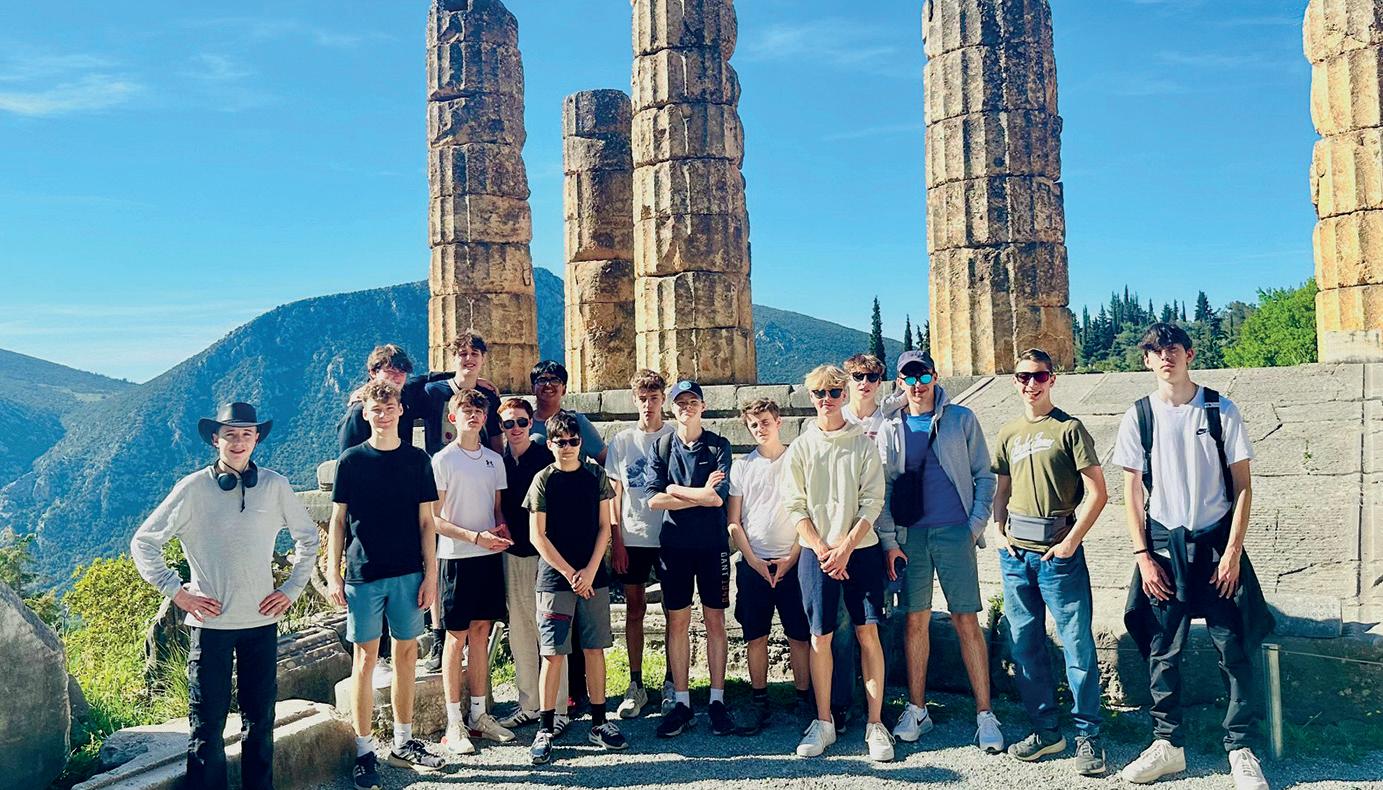
“GCSE Classics was challenging but it was always so interesting and engaging. I particularly enjoyed the architectural elements of the course, comparing Greek and Roman temples. One main highlight was travelling to Greece and seeing the artefacts and ancient sites in the flesh, which made it all come to life.”
Computers are playing an ever-increasing role in society and studying Computer Science is an excellent way to learn how to interact in the digital society of the future. This subject is a far-reaching discipline that offers employment and research opportunities in a wide variety of fields. Graduates have excellent career prospects with a constant demand and high starting salaries. This subject is also an excellent choice for students considering further or higher education as it develops logical reasoning, analysis and problem-solving skills. Computer Science is ideal for students with an aptitude or interest in the subject and should be the first choice for those who wish to take their studies in the subject further, or who are considering Computing as a career option.
What will I learn?
• What goes on at component level
• How to program using Python
• Operating systems
• Programming concepts such as variables, selection (IF), sequence and iteration (loops)
• How text, images and sound are represented inside computers using only 1s and 0s
• Using algorithms either in the form of flow charts or pseudocode to design computer systems
• How computers communicate across networks
• Computer hardware and software including the use of logic gates and Von Neumann architecture
• Flowcharting
• How to stay safe from cyber security threats
• Encryption
• Ethical and environmental issues
• How computers are affecting society
• The Internet
• Storage devices
• Memory
• CPU architecture
Written examination 1: Computer Systems, 90-minute exam = 50%
Written examination 2: Programming, 90-minute exam = 50% Grades possible 9 – 1
Computer Science is a far-reaching discipline that offers deep and rewarding employment or research opportunities in a wide variety of fields In fact, there are very few areas of human endeavour that are not becoming computerised
Career possibilities include software development, engineering, cyber security analyst, robotics, forensics, artificial intelligence, information systems management, database administrator, systems analyst, game design, cloud architecture, technical author, software testing, helpdesk manager, networks engineer, military applications, encryption, web design, business information systems, research, teaching and training, hardware design and development .


“I really enjoyed studying GCSE Computer Science. It is a unique course that combines maths with practical coding and ethics. GCSE Computer Science has bettered my knowledge of the ever-modernising world and has provided me with many valuable skills that will be useful for the rest of my life.”
Design and Technology is a broad subject that allows students to apply what they have learnt in a wide range of subjects and apply it in practical terms. It is a fun, yet technical subject, that embeds knowledge, techniques, and practices from a wide range of subjects, including art and design, business, computer science and geography.
The GCSE in Design and Technology enables students to understand and apply iterative design processes through which they explore, create, and evaluate a range of outcomes The qualification enables students to use creativity and imagination to design and make prototypes (together with evidence of modelling to develop and prove product concept and function) that solve real and relevant problems, considering their own and others’ needs, wants and values It gives students opportunities to apply knowledge from other disciplines, including mathematics, science, art and design, computing, and humanities
Students will acquire subject knowledge in design and technology that builds on Key Stage 3, incorporating knowledge and understanding of different materials and manufacturing processes in order to design and make, with confidence, prototypes in response to issues, needs, problems and opportunities Students learn how to take design risks, helping them to become resourceful, innovative, and enterprising citizens They should develop an awareness of practices from the creative, engineering and manufacturing industries
Through the critique of the outcomes of design and technology activity, both historic and present day, students should develop an understanding of its impact on daily life and the wider world and understand that high-quality design and technology is important to the creativity, culture, sustainability, wealth and wellbeing of the nation and the global community

Component 1: Written examination: 1 hour and 45 minutes = 50% of the qualification and 100 marks
Component 2: Non-examined assessment, 50% of the qualification and 100 marks
A subject like Design and Technology lends itself to a wide range of careers such as product design, architectural technology, automotive engineering, civil engineering, building services, construction, electrical engineering, mechanical engineering, and mechatronics to name just a few .
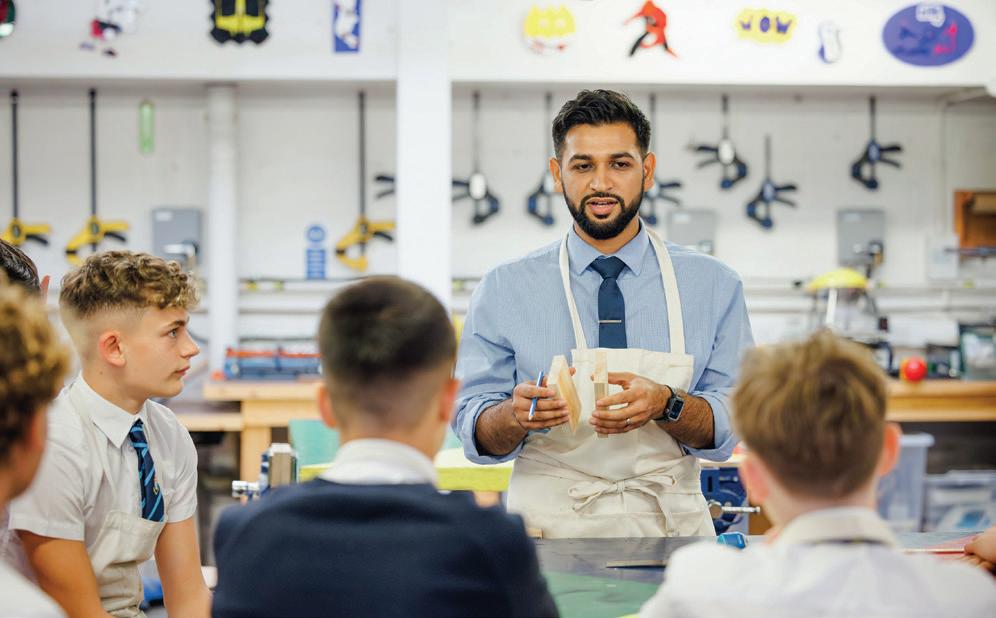
“The Design and Technology GCSE empowers you to turn ideas into reality, blending creativity with functionality to solve real-world problems. Studying Design and Technology at Halliford School allows you to develop your understanding of how to use the iteration process to create and design products to fit an ever-changing world where you are encouraged to take risks and demonstrate problem-solving skills.”
Drama is an excellent subject to study for students pursuing any profession which would involve public speaking, creativity and working with customers. In Drama, students are given the opportunity to work collaboratively with other students and take charge of the direction of their learning. It is a fun course which gives you the freedom to be a performer or designer of theatre and explore the issues that you find relevant.
DRAMA: PERFORMANCE AND RESPONSE
What’s assessed?
• Knowledge and understanding of drama and theatre
• Study of one set play from a choice of six
• Analysis and evaluation of the work of live theatre makers
DEVISING DRAMA
What’s assessed?
• Process of creating devised drama
• Performance of devised drama (students may contribute as performer or designer)
• Analysis and evaluation of own work
How it’s assessed?
• Written exam: 1 hour and 30minutes
• 80 marks 40% of GCSE
How it’s assessed?
• Devising log
• Devised performance
• 60 marks in total 30% of GCSE
PRESENTING AND PERFORMING TEXTS
What’s assessed?
• Performance of two extracts from one play (students may contribute as performer or designer)
• Free choice of play but it must contrast with the set play chosen for Component 1
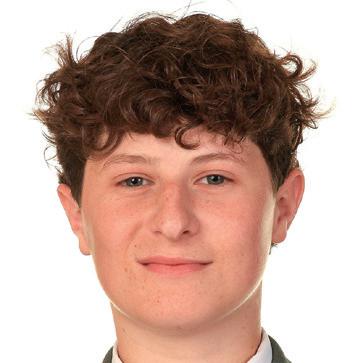
How it’s assessed?
• 60 marks in total 30% of GCSE
Assessment
In Year 10:
• A live performance of their devised work and a Devising log to compliment the work
In Year 11:
• A live performance in front of an examiner
• A written exam on a play text studied and a live theatre performance
What can it lead on to?
Studying GCSE Drama can lead to A Level Theatre Studies and a degree in that subject Career options include (but are not limited to):
• Actor/ Director/ Theatre Designer
• Teacher/ Lecturer
• Youth and Community Worker/ Social Worker
• Journalist
• Director of PR/ Marketing
The confidence and performance skills you will acquire through the study of Drama will support you in any future career where you will need to meet people or make presentations

“GCSE Drama helped me to develop my confidence and allowed me to focus on the creative side of school, which I love. I found the teachers in the department to be supportive and inspirational in all aspects of the subject. The Theatre is a great space to work in, and I look back fondly at the work I created at GCSE.”
Exam Board: OCR (J386)
GCSE Geography is a subject that offers students a comprehensive understanding of the world around them. It is not just about learning locations or natural features but also about understanding the intricate dynamics of our world - why things happen, who is responsible, and who is affected. The course promotes critical thinking, encouraging students to question and explore various aspects of the world, from natural hazards and ecosystems to urban futures.
Fieldwork is a key component, providing practical experience and a different perspective on learning Currently, the Department takes students to the River Tillingbourne in the Surrey Hills to measure different river characteristics The second field trip studies the East End of London to explore the London Docklands redevelopment around Canary Wharf and compare the quality of life with that of the surrounding areas
Moreover, the skills acquired in GCSE Geography, such as data interpretation and critical thinking, are highly transferable and sought after in many fields . These skills enable students to navigate our fast-changing, dynamic world, making them attractive candidates for future studies and careers
In essence, GCSE Geography equips students with the tools to understand complex issues at a variety of scales and the impact of our actions as humans on the planet, making it a valuable stepping stone to a multitude of opportunities . It is a subject that cultivates informed, engaged, and empathetic individuals ready to make a difference in the world
At the end of the course there are three exams that are generally broken down into Physical Geography topics (Our Natural World), Human Geography topics (People and Society) and Geographical skills and application (Geographical Exploration) .

Examination 1: Our Natural World; 1 hour and 15 minutes = 35%
Examination 2: People and Society; 1 hour and 15 minutes = 35%
Examination 3: Geographical Exploration; 1 hour and 30 minutes = 30%
Studying Geography at GCSE opens a world of possibilities . This highly respected academic subject is recognised for its comprehensive coverage of diverse topics, making students attractive candidates for future employers and universities The skills acquired, such as the use of ICT, data interpretation and critical thinking, are transferable and highly sought after in numerous fields
Geography can pave the way to a multitude of careers, such as Business Management, Economics, Politics, Engineering, Law, and Computer Science; the opportunities are vast The everincreasing need for critical thinkers and empathetic individuals in our society means that students of Geography stand out They are equipped with the tools to understand complex local, regional and global issues and the impact that we as humans have on the planet .
“Studying Geography at GCSE was one of the best decisions I made. It has helped me understand the world in a deeper way—how natural processes work, why countries are connected, and how humans impact the environment. Geography is not just a subject; it is about real-world issues like climate change, global inequality, and sustainability. It has given me skills I use across all my studies, like problem-solving, critical thinking, and teamwork. If you want to make sense of the world and your place in it, Geography is the perfect choice.”
Exam Board: Edexcel (1H10FR)
Studying GCSE History will help you to develop a greater understanding of the world in which we live. An understanding of the past is imperative in order to understand the present, and the forces that have helped to shape it. However, the most important reason for a student to study GCSE History is because they have enjoyed it as a subject in Years 7 – 9 and would like to develop and build on their historical knowledge in more depth.
The History GCSE course builds on the approach to the study of History taken in Key Stage 3 . It seeks to further develop a passion for the subject by providing students with a broad experience of different historical periods and themes Over the two-year course, students will therefore study four discrete topics spread over three exam papers
In Year 10, we start with a development study, Medicine Through Time, c 1250 to present, in which we cover almost 1000 years of history, using the theme of medicine to help us understand key historical periods We follow this with an in-depth study on Weimar and Nazi Germany, 1918-1939, in which we study Germany in the 1920s followed by the rise of the Nazis, and then life in Nazi Germany in the 1930s
In Year 11, we again study two contrasting options We start with Early Elizabethan England 1558-88, and learn about Elizabethan government and religion, challenges to Elizabeth and Elizabethan Society in the age of exploration . We then learn about the Cold War from 1941 to 1991 from the origins of the Cold War, through its main crises and to its end with the collapse of the Soviet Union in 1991

Three separate written examinations sat at the end of Year 11:
Paper 1 – Thematic Study and Historic Environment –‘Medicine in Britain c1250 – present’ = 30%
Paper 2 – Period Study and British Depth Study – ‘Superpower Relations and the Cold War 1941-91’ and ‘Early Elizabethan England 1558–88’ = 40%
Paper 3 – Modern Depth Study – ‘Weimar and Nazi Germany 1918–1939’ = 30%
A qualification in History provides the basis for a wide variety of professions and careers and can offer students a stepping-stone to a diverse range of employment opportunities The subject aims first and foremost to equip students with an analytical mind capable of developing an independent, fact-based perspective, and communicating clearly through the construction of a coherent written argument For this reason, a GCSE in History has been useful to students who have gone on to make a career in law, the Civil Service, politics, academia and the media
WHAT I ENJOYED ABOUT THIS SUBJECT
“History is a great choice for GCSE because you have the opportunity to learn about a diverse range of topics and deepen your understanding of the vast changes that have taken place in the world. My favourite paper was the Cold War because it was interesting to find out how each leader from the East and the West brought about their own changes to the system and the way this impacted their foreign policy. By taking GCSE History, I have developed better analytical writing and how to write evaluative judgements, which is really helpful in other subjects. I chose to continue the subject to A Level because I thoroughly enjoyed it and feel there is still so much to learn.”
Exam Board: OCR (J282G)
The study of Latin introduces students to a different time, a different culture and a different language which are at the same time amazingly familiar. It covers a breadth of areas appealing to almost any interest and this is one of its many attractions. As well as being enjoyable, the course develops a rounder and more knowledgeable student.
Latin introduces students to some of the finest literature ever written It is both fascinating and a source of enormous influence on European Civilisation . In fact, there is hardly any area of study on which Latin and the ancient world have not left their mark
It connects well with almost every other subject, containing as it does, linguistic, literary, and historical/sociological aspects . The emphasis on logical thought and calculation will benefit the scientist and mathematician The literary appreciation involved in the study of the set texts makes it a suitable companion for English and other literature-based subjects; it will also help students understand structures and vocabulary in their own language and to write with sophistication The link with History is apparent and will help to reinforce the skills required for that particular subject, whilst the language and vocabulary skills gained will be invaluable to students’ application in modern European languages, many of which descend from Latin
The course combines language work, the study of a selection of Latin literature and culture Students will continue with grammar learning using John Taylor’s GCSE course book and students will begin the study of the prose set text from the Cambridge Latin Anthology This will be stories about the life and times of the famous adulterer Messalina and also Pliny the Elder, with

particular focus on the eruption of Vesuvius . Students will also study aspects of Roman life from sources in translation, looking at Roman Entertainment and Roman Myths and Beliefs .
50%: A language paper containing unseen translation and comprehension exercises (1 hour 30 minutes)
25%: A prose set text paper called Latin Literature (1 hour)
25%: A sources paper called Literature and Culture (1 hour)
There is no coursework for GCSE Latin A prescribed vocabulary list is provided to assist with the language paper in both the Higher and Foundation tiers .
The study of Latin at GCSE can lead onto anything you want Universities and employers are looking for people who are not frightened of a challenge, can solve problems, think precisely and logically, and communicate clearly The study of Latin will give you all these skills as well as an understanding of the Ancient World
“I was drawn to taking Latin at GCSE as its historical significance piqued my interest from Year 7 all the way through to Year 9. Studying Latin at GCSE, we had the opportunity to read ancient literature written in Latin, learn about the lives of the Romans, and, of course, learn the language itself. With a very small class of only four people, our teachers were able to cater specifically to our needs and give us detailed feedback. I highly recommend the subject to anyone who enjoys learning the language and is interested in ancient history.”
• It enables creative learning
• It allows communication in a unique language
• It enables students to express themselves
• It broadens horizons
• It is varied and interesting and a journey of discovery
The syllabus requires students to demonstrate their skills in performing (solo and ensemble) and composing and develops their understanding of a wide variety of musical genres including Instrumental and Vocal Music, Fusions and Music for the Stage and Screen All the skills needed to complete the course are taught along the way, although it is expected that candidates choosing GCSE Music sing or play an instrument at grade 4 or above standard, enabling them to complete the GCSE with the best possible grade If you have any doubts, these can be discussed with the Director of Music .
Course requirements:
• Ability to perform on one or more instruments or voice
• An interest in learning how to compose your own music
• An interest in how music works across a wide variety of styles and genres
Assessment
Performing (30%)
• Solo performance (15%)
• Ensemble performance (15%)
Composing (30%)
• Composition 1 (15%)
• Composition 2 (15%)
Appraising
• Written exam (40%)

• It has links to real life
• It is academically rigorous, whilst also being 60% practical
• It is well respected by top universities
• It is fulfilling and challenging
• Students learn the essence of musical style and genre through the study of 8 diverse set works At the end of the course they will sit a 1-hour 45-minute paper consisting of short and long answer questions about the pieces studied and about unknown pieces of music There is also a simple dictation exercise
The music industry offers a huge range of opportunities in many different careers Students who study GCSE Music will find plenty of opportunities when it comes to choosing a future path With an awareness of musical genres and styles, performing, listening and composing skills and music technology proficiency, students will be well equipped to pursue a musical profession GCSE Music also offers a wealth of transferable skills relevant to ongoing musical and non-musical study as well as to future career development, including literacy, critical thinking, social skills and team working, leadership and communication, and time management and organisational skills .

“GCSE Music was absolutely a highlight of Years 10 and 11. We investigated many different styles, genres, and techniques within music. Composing was always the best part of my week, and using Logic Pro X really helped with new ideas and creativity. I would highly recommend this course to anyone interested, it is such a positive and inspiring subject to learn about.”
Exam Board: Edexcel (1PE0)
The course builds upon the knowledge, understanding and sporting skills established in Key Stage 3 Physical Education. It will give students an opportunity to try new and exciting activities promoting an active and healthy lifestyle.
Students considering this option should be enthusiastic and committed participants in a range of physical education and games activities. They should be prepared to develop greater knowledge and understanding of activities to improve performance.
The Theory of Physical Education:
Component 1: Fitness and Body Systems
• Topics include applied anatomy and physiology, movement analysis, physical training and use of data
Component 2: Health and Performance
• Health, fitness and wellbeing, sports psychology, sociocultural influences and use of data
Assessment
Component 1: 1 hour 45-minute exam = 36% of qualification
Component 2: 1 hour 15-minute exam = 24% of qualification .
Component 3: Practical Performance = 30% of qualification
Students will be assessed in three physical activities from a set list
One must be a team activity, one individual and one free choice
Component 4: Personal Exercise Programme = 10% of qualification
Students will complete this as a coursework-based task
Physical Education lends itself to a range of careers in sports and fitness as well as other industries that you may not have considered before . For example, many nutritionists, physical therapists, and chiropractors have an A Level and Degree in P E
Some careers that you could consider doing with P E include: sports scientist, P E teacher, physiotherapist, professional sports person, sports coach/ consultant, sports policy at local and national level, diet and fitness instructor, and personal training, to name a few


“If you love sport, GCSE PE is the perfect subject for you! It’s packed with fascinating topics like anatomy and physiology, helping you really understand how the body works in sport. Plus, it gives you the skills and knowledge you need to smoothly move on to the A Level course, making the step up from GCSEs feel much easier. For anyone passionate about sport, this subject is a great fit!”
Exam board: AQA (8062)
Would you like to be able to better understand why people think and act the way they do and why our society is ordered in the way it is? In an increasingly globalised society, where over 80% of the global population identifies with a religious group, studying GCSE Religious Studies will help enable you to become a citizen of the world and engage with other cultures. You may also enjoy debating, looking at thought-provoking topics, and playing the devil’s advocate. In the GCSE, we tackle hard-hitting and difficult topics found in philosophy and ethics. This includes the nature of warfare, the problem of evil, medical ethics, and others besides. The study of Religion, Philosophy and Ethics helps students to listen empathetically, speak thoughtfully and write convincingly.
During Year 10, students will study the beliefs, teachings and practices of Christianity and Islam During Year 11, students will study religious philosophy and ethics: Relationships and families, religions and life, the existence of God, peace and conflict, crime and punishment and human rights and social justice
Area of Study 1 (Christianity and Islam): 1 written paper, 1 hour 45 minutes = 50% of the final grade
Area of Study 2 (Philosophy & Ethics): 1 written paper, 1 hour 45 minutes = 50% of the final grade
Studying GCSE Religious Studies can lead to A Level Religious Studies (also known as ‘Philosophy and Ethics’) It complements other A Level subjects as you learn the key skills of long-form writing, debate and research skills At university, the subject lends itself to a degree in the Humanities or Social Sciences,

including Theology and Philosophy, PPE, Law, International Relations, History and Politics . Many career paths value the skills and knowledge developed in the subject . In particular, developing your ability to engage and debate with people of varying backgrounds and standpoints, articulate your views well, and write to a high standard are especially valued The subject supports the career paths found in:
• Law
• Politics
• Civil Service
• Consultancy
• The Police
• Academia and Education
• All career paths where people skills and writing ability are essential
“I am very glad that I chose Religious Studies for GSCE as it gives students a chance to share their beliefs in a judgment-free zone while also being educated, especially in vital topics, including the political and ethical state of the world. The Religious Studies department is genuinely dedicated and passionate about getting the best outcomes for every student and giving them all the support they need while ensuring that students enjoy the subject to the fullest.”

